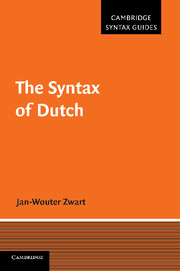Book contents
13 - Binding and control
from III - Theory
Published online by Cambridge University Press: 07 September 2011
Summary
Of the many dependencies in the syntax of Dutch discussed in chapter 7, those involving the interpretation of semi-referential expressions (‘binding’) and missing subjects of infinitival clauses (‘control’) have featured more prominently in the recent history of syntactic theory than most of the others. For example, discussion of wh-movement in Dutch has never played a significant role in the development of syntactic theory. We therefore feel somewhat justified in restricting ourselves to the theoretical discussion of Dutch binding and control phenomena in this final chapter.
Binding
The distribution and interpretation of semi-referential elements (pronouns, anaphors) in Dutch, studied widely and intensively from the mid-1970s on, has proved a useful playground for the implementation and assessment of theories of binding formulated for English. The point of reference is typically a version of the Binding Theory of Chomsky (1981: 188), summarized in (13.1).
where α binds β if and only if α and β are coindexed (coreferential) and α c-commands β (Chomsky 1981: 184), and α c-commands β if and only if all nodes dominating α dominate β (cf. Chomsky 1981: 166).
Information
- Type
- Chapter
- Information
- The Syntax of Dutch , pp. 344 - 354Publisher: Cambridge University PressPrint publication year: 2011
